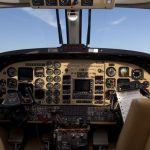 I wrote recently about the Korean project, called PIBOT, that was showcasing the latest developments in automated aircraft piloting. Via an array of cameras the device is capable of navigating its environment, with arms and legs then used to operate the controls.
I wrote recently about the Korean project, called PIBOT, that was showcasing the latest developments in automated aircraft piloting. Via an array of cameras the device is capable of navigating its environment, with arms and legs then used to operate the controls.
Of course, the days of machines replacing pilots are perhaps a way off, and Airbus themselves predicted recently that some 500,000 pilots will be needed by 2035. Technology has attempted to help in this area by utilizing virtual reality to enhance simulators as they train pilots.
Fascinating though these solutions are, they still usually require the pilot to be away from work sitting in the simulator for a period of time.
Learning on the fly
An innovative solution to this dilemma is being worked on by a team from University College London (UCL), who are developing an AI based autopilot that is capable of learning itself. This in itself is a significant breakthrough as today’s autopilots are pretty static creations that are very difficult to alter from their well-defined strategies and checklists.
This means that when something outside of this narrow confines is thrown at it, the system is forced to cede control to the human pilot.
The UCL team therefore set out to develop an autopilot that could learn from how humans manage extreme situations, such as an engine failure.
The system utilizes ten different artificial neural networks in their initial prototype, although hundreds would be required for the more complex situations presented by a real world product.
Training the system
The system was trained via each neural network observing human pilots as they used a flight simulator. As the pilots conducted the various tasks, from taking off to handling difficult weather conditions, the ANNs were learning from their maneuvers. This therefore allows the system to know how best to respond in a particular circumstance.
Early tests of the system suggest that it can perform well in laboratory conditions, even when put through circumstances such as extreme turbulence or even a failed engine.
Indeed, the system was even capable of successfully flying craft that it had not been trained on, suggesting that the researchers had achieved a degree of success developing a system capable of generalized learning.
Suffice to say, this is a very early stage project, but UCL are one of a number of groups exploring this issue, including some of the major manufacturers. In reality, it’s likely that we’ll see such systems deployed in drones long before they’re used in commercial jets, especially as neural networks can make it difficult to decode just why they behave as they do, hence why they are not currently validated by aviation authorities.